雅思阅读Unit 5
雅思阅读 5

出题原则
• 顺序原则 几乎所有的判断题都是严格遵守“顺序原则”的,也就是 说题目的顺序与文章的顺序是一致的。 • 只考细节 判断题属于细节题,因此几乎不需要对上下文的理解并进 行推断,也不能根据自己的背景知识直接判断。简单地说 来,解题的关键不是对文章大意的把握,而是找到与题目 相关的原文,根据原文的信息进行解题。 • 同义转换 和所有的雅思阅读细节题一样,判断题的题目都是基于原 文,与原文形成同义转换(paraphrasing)的关系。同义转 换包括同义句型转换和同义词转换两种类别。
TRUE之判断标准
• 1) 题目是原文的同义转换 ) • 原文:Few rabbits in the wildness are more than five years old. • 题目:Most rabbits are less than five years old. • 原文:Computers are gaining in popularity, despite their cost. • 题目:Computers are more popular than they used to be.
• 两大类题型:一种是TRUE / FALSE/ NOT GIVEN,另一 种是YES/ NO/ NOT GIVEN. • Yes”,“No”,“Not Given”和“True”,“False”,“Not Given”只是考试形式的区别,在判断方式上并没有本质不 同。 • 提问方式: Do the following statements agree with the information given in Reading Passage X?
• 在考试过程当中遇见must或only这样类型的词的时候,不 妨仔细阅读原文看看原文所描述的是不是仅仅单一只是题 目所涉及的条件。有only存在但是答案不是FALSE的情况 比比皆是. • 题目:The Chapel View Restaurant is for students
剑桥雅思初级 unit5 reading

注意:
1.填空答案必须符合语法;
2.绝大部分答案来自原文原词;
3.答案字数不会太长。一般不超过4个字。
(1)NO MORE THAN TWO/THREE/FOUR WORDS (不超过2/3/4个字); (2)ONE OR TWO WORDS (一个或两个字); (3)USE A MAXIMUM OF TWO WORDS(最多两个字)。有字数限制的, 一定要严格按照要求去做,必须满足要求。
sentence completion
11
Add your text here and write down your opninon thank you add your text here
Reading 2
11
Add your text here and write down your opninon thank you add your text here
11
Add your text here and write down your opninon thank you add your text here
DO YOU KNOW THESE ANIMALS?
01 PASS 01 Brief introduction
11
fennec fox
Байду номын сангаас
lizard
farmland and river valleys from Spain to Kazakhstan and Africa
2. How long do they live?
11
5-6 years
vocabulary
11
Add your text here and write down your opninon thank you add your text here
剑桥雅思阅读5原文翻译及答案(test1)
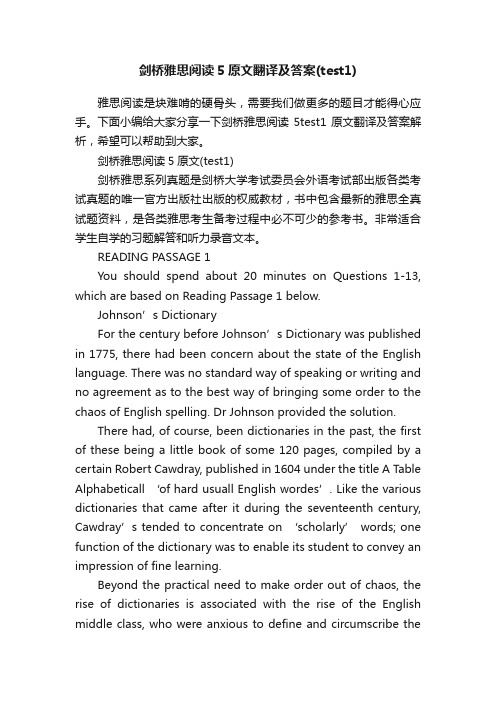
剑桥雅思阅读5原文翻译及答案(test1)雅思阅读是块难啃的硬骨头,需要我们做更多的题目才能得心应手。
下面小编给大家分享一下剑桥雅思阅读5test1原文翻译及答案解析,希望可以帮助到大家。
剑桥雅思阅读5原文(test1)剑桥雅思系列真题是剑桥大学考试委员会外语考试部出版各类考试真题的唯一官方出版社出版的权威教材,书中包含最新的雅思全真试题资料,是各类雅思考生备考过程中必不可少的参考书。
非常适合学生自学的习题解答和听力录音文本。
READING PASSAGE 1You should spend about 20 minutes on Questions 1-13, which are based on Reading Passage 1 below.Johnson’s DictionaryFor the centur y before Johnson’s Dictionary was published in 1775, there had been concern about the state of the English language. There was no standard way of speaking or writing and no agreement as to the best way of bringing some order to the chaos of English spelling. Dr Johnson provided the solution.There had, of course, been dictionaries in the past, the first of these being a little book of some 120 pages, compiled by a certain Robert Cawdray, published in 1604 under the title A Table Alphabeticall ‘of hard usuall English wordes’. Like the various dictionaries that came after it during the seventeenth century, Cawdray’s tended to concentrate on ‘scholarly’ words; one function of the dictionary was to enable its student to convey an impression of fine learning.Beyond the practical need to make order out of chaos, the rise of dictionaries is associated with the rise of the English middle class, who were anxious to define and circumscribe thevarious worlds to conquer —lexical as well as social and commercial. it is highly appropriate that Dr Samuel Johnson, the very model of an eighteenth-century literary man, as famous in his own time as in ours, should have published his Dictionary at the very beginning of the heyday of the middle class.Johnson was a poet and critic who raised common sense to the heights of genius. His approach to the problems that had worried writers throughout the late seventeenth and early eighteenth centuries was intensely practical. Up until his time, the task of producing a dictionary on such a large scale had seemed impossible without the establishment of an academy to make decisions about right and wrong usage. Johnson decided he did not need an academy to settle arguments about language; he would write a dictionary himself and he would do it single-handed. Johnson signed the contract for the Dictionary with the bookseller Robert Dosley at a breakfast held at the Golden Anchor Inn near Holbom Bar on 18 June 1764.He was to be paid £1.575 in instalments, and from this he took money to rent Gou gh Square, in which he set up his ‘dictionary workshop’.James Boswell, his biographer, described the garret where Johnson worked as ‘fitted up like a counting house’ with a long desk running down the middle at which the copying clerks would work standing up. Johnson himself was stationed on a rickety chair at an ‘old crazy deal table’ surrounded by a chaos of borrowed books. He was also helped by six assistants, two of whom died whilst the Dictionary was still in preparation.The work was immense; filling about eighty large notebooks (and without a library to hand), Johnson wrote the definitions of over 40,000 words, and illustrated their many meanings with some 114,000 quotations drawn from English writing on everysubject, from the Elizabethans to his own time. He did not expect to achieve complete originality. Working to a deadline, he had to draw on the best of all previous dictionaries, and to make his work one of heroic synthesis. In fact, it was very much more. Unlike his predecessors, Johnson treated English very practically, as a living language, with many different shades of meaning. He adopted his definitions on the principle of English common law —according to precedent. After its publication, his Dictionary was not seriously rivalled for over a century.After many vicissitudes the Dictionary was finally published on 15 April 1775. It was instantly recognised as a landmark throughout Europe. ‘This very noble work,’ wrote the leading Italian lexicographer, ‘will be a perpetual monument of Fame to the Author, an Honour to his own Country in particular, and a general Benefit to the republic of Letters throughout Europe" The fact that Johnson had taken on the Academies of Europe and matched them (everyone knew that forty French academics had taken forty years to produce the first French national dictionary) was cause for much English celebration.Johnson had worked for nine years, ‘with little assistance of the learned, and without any patronage of the great; not in the soft obscurities of retirement, or under the shelter of academic bowers, but amidst inconvenience and distraction, in sickness and in sorrow’. For all its faults and eccentricities his two-volume work is a masterpiece and a landmark, in his own words, ‘setting the orthography, displaying the analogy, regulating the structures, and ascertaining the significations of English words’. It is the cornerstone of Standard English an achievement which, in James Boswell’s words ‘conferred stability on the language of his country.’The Dictionary, together with his other writing, made Johnson famous and so well esteemed that his friends were able to prevail upon King George Ⅲ to offer him a pension. From then on, he was to become the Johnson of folklore.Questions 1-3Choose THREE letters A-H.Write your answers in boxes 1-3 on your answer sheet.NB Your answers may be given in any order.Which THREE of the following statements are true of Johnson’s Dictionary?A It avoided all scholarly words.B It was the only English dictionary in general use for 200 years.C It was famous because of the large number of people involved.D It focused mainly on language from contemporary texts.E There was a time limit for its completion.F It ignored work done by previous dictionary writers.G It took into account subtleties of meaning.H Its definitions were famous for their originality.Questions 4-7Complete the summary.Choose NO MORE THAN TWO WORDS from the passage for each answer.Write your answers in boxes 4-7 on your answer sheet.In 1764 Dr Johnson accepted the contract to produce a dictionary. Having rented a garret, he took on a number of 4…………, who stood at a long central desk. Johnson did not have a 5………… available to him, but eventually produced definitions of in excess of 40,000 words written down in 80 large notebooks.On publications, the Dictionary was immediately hailed in many European countries as a landmark. According to his biographer, James Boswell, Johnson’s principal achievement was to bring 6……… to the English language. As a reward for his ha rd work, he was granted a 7………by the king.Questions 8-13Do the following statements agree with the information given in Reading Passage 1?In boxes 8-13 on your answer sheet, writeTRUE if the statement agrees with the informationFALSE if the statement contradicts the informationNOT GIVEN if there is no information on this8 The growing importance of the middle classes led to an increased demand for dictionaries.9 Johnson has become more well known since his death.10 Johnson had been planning to write a dictionary for several years.11 Johnson set up an academy to help with the writing of his Dictionary.12 Johnson only received payment for his Dictionary on its completion.13 Not all of the assistants survived to see the publication of the Dictionary.READING PASSAGE 2You should spend about 20 minutes on Questions 14-26, which are based on Reading Passage 2 below.Nature or Nurture?A A few years ago, in one of the most fascinating and disturbing experiments in behavioural psychology, Stanley Milgram of Yale University tested 40 subjects from all walks of lifefor their willingness to obey instructions given by a ‘leader’ in a situation in which the subjects might feel a personal distaste for the actions they were called upon to perform. Specifically M ilgram told each volunteer ‘teacher-subject’ that the experiment was in the noble cause of education, and was designed to test whether or not punishing pupils for their mistakes would have a positive effect on the pupils’ ability to learn.B Milgram’s expe rimental set-up involved placing the teacher-subject before a panel of thirty switches with labels ranging from ‘15 volts of electricity (slight shock)’ to ‘450 volts (danger —severe shock)’ in steps of 15 volts each. The teacher-subject was told that whenever the pupil gave the wrong answer to a question, a shock was to be administered, beginning at the lowest level and increasing in severity with each successive wrong answer. The supposed ‘pupil’ was in reality an actor hired by Milgram to simulate receiving the shocks by emitting a spectrum of groans, screams and writings together with an assortment of statements and expletives denouncing both the experiment and the experimenter. Milgram told the teacher-subject to ignore the reactions of the pupil, and to administer whatever level of shock was called for, as per the rule governing the experimental situation of the moment.C As the experiment unfolded, the pupil would deliberately give the wrong answers to questions posed by the teacher, thereby bringing on various electrical punishments, even up to the danger level of 300 volts and beyond. Many of the teacher-subjects balked at administering the higher levels of punishment, and turned to Milgram with questioning looks and/or complaints about continuing the experiment. In these situations, Milgramcalmly explained that the teacher-subject was to ignore the pupil’s cries for mercy and carry on with the experiment. If the subject was still reluctant to proceed, Milgram said that it was important for the sake of the experiment that the procedure be followed through to the end. His final argument was ‘you have no other choice. You must go on’. What Milgram was trying to discover was the number of teacher-subjects who would be willing to administer the highest levels of shock, even in the face of strong personal and moral revulsion against the rules and conditions of the experiment.D Prior to carrying out the experiment, Milgram explained his idea to a group of 39 psychiatrists and asked them to predict the average percentage of people in an ordinary population who would be willing to administer the highest shock level of 450 volts. The overwhelming consensus was that virtually all the teacher-subjects would refuse to obey the experimenter. The psychiatrists felt that ‘most subjects would not go beyond 150 volts’ and they further anticipated that only four per cent would go up to 300 volts. Furthermore, they thought that only a lunatic fringe of about one in 1,000 would give the highest shock of 450 volts.E What were the actual results? Well, over 60 per cent of the teacher-subjects continued to obey Milgram up to the 450-volt limit in repetitions of the experiment in other countries, the percentage of obedient teacher-subjects was even higher, reaching 85 per cent in one country. How can we possibly account for this vast discrepancy between what calm, rational, knowledgeable people predict in the comfort of their study and what pressured, flustered, but cooperative ‘teachers’ actually do in the laboratory of real life?F One’s first inclination might be to argue that there must be some sort of built-in animal aggression instinct that was activated by the experiment, and that Milgram’s teache-subjects were just following a genetic need to discharge this pent-up primal urge onto the pupil by administering the electrical shock. A modern hard-core sociobiologist might even go so far as to claim that this aggressive instinct evolved as an advantageous trait, having been of survival value to our ancestors in their struggle against the hardships of life on the plains and in the caves, ultimately finding its way into our genetic make-up as a remnant of our ancient animal ways.G An alternative to this notion of genetic programming is to see the teacher-subjects’ actions as a result of the social environment under which the experiment was carried out. As Milgram himself pointed out, ‘Most subjects in the experiment see their behaviour in a larger context that is benevolent and useful to society —the pursuit of scientific truth. The psychological laboratory has a strong claim to legitimacy and evokes trust and confidence in those who perform there. An action such as shocking a victim, which in isolation appears evil, acquires a completely different meaning when placed in this se tting.’H Thus, in this explanation the subject merges his unique personality and personal and moral code with that of larger institutional structures, surrendering individual properties like loyalty, self-sacrifice and discipline to the service of malevolent systems of authority.I Here we have two radically different explanations for why so many teacher-subjects were willing to forgo their sense of personal responsibility for the sake of an institutional authorityfigure. The problem for biologists, psychologists and anthropologists is to sort out which of these two polar explanations is more plausible. This, in essence, is the problem of modern sociobiology — to discover the degree to which hard-wired genetic programming dictates, or at least strongly biases, the interaction of animals and humans with their environment, that is, their behaviour. Put another way, sociobiology is concerned with elucidating the biological basis of all behaviour.Questions 14-19Reading Passage 2 has nine paragraphs, A-I.Which paragraph contains the following information?Write the correct letter A-I in boxes 14-19 on your answer sheet.14 a biological explanation of the teacher-subjects’ behaviour15 the explanation Milgram gave the teacher-subjects for the experiment16 the identity of the pupils17 the expected statistical outcome18 the general aim of sociobiological study19 the way Milgram persuaded the teacher-subjects to continueQuestions 20-22Choose the correct letter, A, B, C or D.Write your answers in boxes 20-22 on your answer sheet.20 The teacher-subjects were told that were testing whetherA a 450-volt shock was dangerous.B punishment helps learning.C the pupils were honest.D they were suited to teaching.21 The teacher-subjects were instructed toA stop when a pupil asked them to.B denounce pupils who made mistakes.C reduce the shock level after a correct answer.D give punishment according to a rule.22 Before the experiment took place the psychiatristsA believed that a shock of 150 volts was too dangerous.B failed to agree on how the teacher-subjects would respond to instructions.C underestimated the teacher-subjects’ willingness to comply with experimental procedure.D thought that many of the teacher-subjects would administer a shock of 450 volts.Questions 23-26Do the following statements agree with the information given in Reading Passage 2?In boxes 23-26 on your answer sheet, writeTRUE if the statement agrees with the informationFALSE if the statement contradicts the informationNOT GIVEN if there is no information on this23 Several of the subjects were psychology students at Yale University.24 Some people may believe that the teacher-subjects’ behaviour could be explained as a positive survival mechanism.25 In a sociological explanation, personal values are more powerful than authority.26 Milgram’s experiment solves an important question in sociobiology.READING PASSAGE 3You should spend about 20 minutes on Questions 27-40,which are based on Reading Passage 3 below.The Truth about the EnvironmentFor many environmentalists, the world seems to be getting worse. They have developed a hit-list of our main fears: that natural resources are running out; that the population is ever growing, leaving less and less to eat; that species are becoming extinct in vast numbers, and that the planet’s air and water are becoming ever more polluted.But a quick look at the facts shows a different picture. First, energy and other natural resources have become more abundant, not less so, since the book ‘The Limits to Growth’ was published in 1972 by a group of scientists. Second, more food is now produced per head of the world’s population than at any time in history. Fewer people are starving. Third, although species are indeed becoming extinct, only about 0.7% of them are expected to disappear in the next 50 years, not 25-50%, as has so often been predicted. And finally, most forms of environmental pollution either appear to have been exaggerated, or are transient —associated with the early phases of industrialisation and therefore best cured not by restricting economic growth, but by accelerating it. One form of pollution — the release of greenhouse gases that causes global warming — does appear to be a phenomenon that is going to extend well into our future, but its total impact is unlikely to pose a devastating problem. A bigger problem may well turn out to be an inappropriate response to it.Yet opinion polls suggest that many people nurture the belief that environmental standards are declining and four factors seem to cause this disjunction between perception and reality.One is the lopsidedness built into scientific research. Scientific funding goes mainly to areas with many problems. That may be wise policy, but it will also create an impression that many more potential problems exist than is the case.Secondly, environmental groups need to be noticed by the mass media. They also need to keep the money rolling in. Understandably, perhaps, they sometimes overstate their arguments. In 1997, for example, the World Wide Fund for Nature issued a press release entitled: ‘Two thirds of the world’s forests lost forever.’ The truth turns out to be nearer 20%.Though these groups are run overwhelmingly by selfless folk, they nevertheless share many of the characteristics of other lobby groups. That would matter less if people applied the same degree of scepticism to environmental lobbying as they do to lobby groups in other fields. A trade organisation arguing for, say, weaker pollution controls is instantly seen as self-interested. Yet a green organisation opposing such a weakening is seen as altruistic, even if an impartial view of the controls in question might suggest they are doing more harm than good.A third source of confusion is the attitude of the media. People are clearly more curious about bad news than good. Newspapers and broadcasters are there to provide what the public wants. That, however, can lead to significant distortions of perception. An example was America’s encounter with El Nino in 1997 and 1998. This climatic phenomenon was accused of wrecking tourism, causing allergies, melting the ski-slopes and causing 22 deaths. However, according to an article in the Bulletin of the American Meteorological Society, the damage it did was estimated at US$4 billion but the benefits amounted to some US$19 billion. These came from higher winter temperatures(which saved an estimated 850 lives, reduced heating costs and diminished spring floods caused by meltwaters).The fourth factor is poor individual perception. People worry that the endless rise in the amount of stuff everyone throws away will cause the world to run out of places to dispose of waste. Yet, even if America’s trash output continues to rise as it has done in the past, and even if the American population doubles by 2100, all the rubbish America produces through the entire 21st century will still take up only one-12,000th of the area of the entire United States.So what of global warming? As we know, carbon dioxide emissions are causing the planet to warm. The best estimates are that the temperatures will rise by 2-3℃ in this century, causing considerable problems, at a total cost of US$5,000 billion.Despite the intuition that something drastic needs to be done about such a costly problem, economic analyses clearly show it will be far more expensive to cut carbon dioxide emissions radically than to pay the costs of adaptation to the increased temperatures. A model by one of the main authors of the United Nations Climate Change Panel shows how an expected temperature increase of 2.1 degrees in 2100 would only be diminished to an increase of 1.9 degrees. Or to put it another way, the temperature increase that the planet would have experienced in 2094 would be postponed to 2100.So this does not prevent global warming, but merely buys the world six years. Yet the cost of reducing carbon dioxide emissions, for the United States alone, will be higher than the cost of solving the world’s single, most pressing health problem: providing universal access to clean drinking water and sanitation. Such measures would avoid 2 million deaths every year, andprevent half a billion people from becoming seriously ill.It is crucial that we look at the facts if we want to make the best possible decisions for the future. It may be costly to be overly optimistic — but more costly still to be too pessimistic.Questions 27-32Do the following statements agree with the claims of the writer in Reading Passage 3?In boxes 27-32 on your answer sheet, writeYES if the statement ag rees with the writer’s claimsNO if the statement contradicts the writer’s clamsNOT GIVEN if it is impossible to say what the writer thinks about this27 Environmentalists take a pessimistic view of the world fora number of reasons28 Data on the Earth’s natural resources has only been collected since 1972.29 The number of starving people in the world has increased in recent years.30 Extinct species are being replaced by new species.31 Some pollution problems have been correctly linked to industrialisation.32 It would be best to attempt to slow down economic growth.Questions 33-37Choose the correct letter, A, B, C or D.Write your answers in boxes 33-37 on your answer sheet.33 What aspect of scientific research does the writer express concern about in paragraph 4?A the need to produce resultsB the lack of financial supportC the selection of areas to researchD the desire to solve every research problem34 The writer quotes from the Worldwide Fund for Nature to illustrate howA influential the mass media can be.B effective environmental groups can be.C the mass media can help groups raise funds.D environmental groups can exaggerate their claims.34 What is the writer’s main point about lobby groups in paragraph 6?A Some are more active than others.B Some are better organised than others.C Some receive more criticism than others.D Some support more important issues than others.35 The writer suggests that newspapers print items that are intended toA educate readers.B meet their readers’ expec tations.C encourage feedback from readers.D mislead readers.36 What does the writer say about America’s waste problem?A It will increase in line with population growth.B It is not as important as we have been led to believe.C It has been reduced through public awareness of the issues.D It is only significant in certain areas of the country.Questions 38-40Complete the summary with the list of words A-I below.Write the correct letter A-I in boxes 38-40 on your answer sheet.GLOBAL WARMINGThe writer admits that global warming is a 38…………….challenge, but says that it will not have a catastrophic impact on our future, if we deal with it in the 39…………… way. If we try to reduce the levels of greenhouse gases, he believes that it would only have a minimal impact on rising temperatures. He feels it would be better to spend money on the more 40………… health problem of providing the world’s population with clean drinking water.A unrealisticB agreedC expensiveD rightE long-termF usualG surprisingH personalI urgent剑桥雅思阅读5原文参考译文(test1)TEST 1 PASSAGE 1参考译文:Johnson’s Dictionary约翰逊博士的字典For the century before Johnson’s Dictionary was published in 1775, there had been concern about the state of the English language. There was no standard way of speaking or writing and no agreement as to the best way of bringing some order to the chaos of English spelling. Dr Johnson provided the solution.约翰逊博士的《字典》于1775年出版,在此之前的一个世纪,人们一直对英语的发展状况担忧。
雅思阅读5
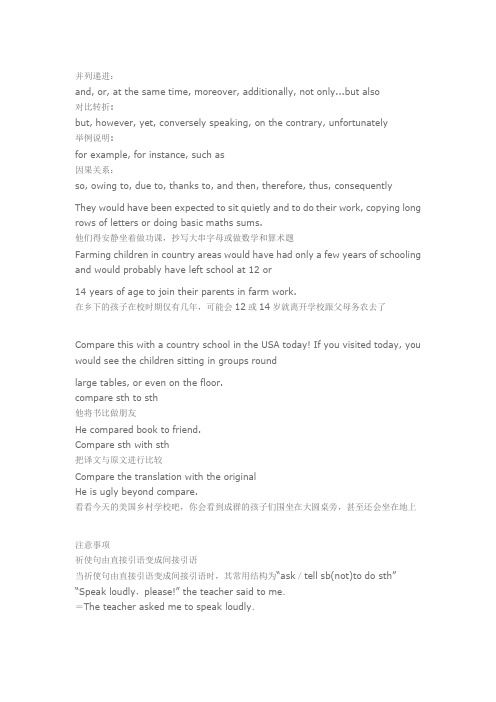
并列递进:and, or, at the same time, moreover, additionally, not only...but also对比转折:but, however, yet, conversely speaking, on the contrary, unfortunately举例说明:for example, for instance, such as因果关系:so, owing to, due to, thanks to, and then, therefore, thus, consequentlyThey would have been expected to sit quietly and to do their work, copying long rows of letters or doing basic maths sums.他们得安静坐着做功课,抄写大串字母或做数学和算术题Farming children in country areas would have had only a few years of schooling and would probably have left school at 12 or14 years of age to join their parents in farm work.在乡下的孩子在校时期仅有几年,可能会12或14岁就离开学校跟父母务农去了Compare this with a country school in the USA today! If you visited today, you would see the children sitting in groups roundlarge tables, or even on the floor.compare sth to sth他将书比做朋友He compared book to friend.Compare sth with sth把译文与原文进行比较Compare the translation with the originalHe is ugly beyond compare.看看今天的美国乡村学校吧,你会看到成群的孩子们围坐在大圆桌旁,甚至还会坐在地上注意事项祈使句由直接引语变成间接引语当祈使句由直接引语变成间接引语时,其常用结构为“ask/tell sb(not)to do sth”“Speak loudly,please!” the teacher said to me.=The teacher asked me to speak loudly.“Don’t smoke in the meeting room!” he said to Tom.=He told Tom not to smoke in the meeting room.They would be working together on a range of different activities, and there would almost certainly be one or more computersin the classroom.他们将在一起协作,____各种各样不同的活动,教室中一定有一部或多部电脑Children nowadays are allowed and even expected to talk quietly to each other while they work, and they are also expected toask their teachers questions and to actively engage in finding out information for themselves, instead of just listening tothe teacher.are allowed and even expected to并列修辞发展/ 丰富/ 社会知识/ 教育develop and promoteenrich and enhancesocial experience and social knowledgeeducate and cultivate在工作的时候今天的孩子们可以甚至应该低声说话,并且也应向老师提问并自己主动参与,而不仅仅是只听老师的(gloom, blush)There are no rules of conduct for teachers out of the classroom, and they are not expected to perform caretaking duties suchas cleaning the classrooms or making pens, but nevertheless their jobs are much harder than they were in the 1900’s.对于老师在课外的行为没有规定了,他们不需要做一些比如做笔扫教室的后勤工作了,然而他们的工作却比19世纪老师的工作难多了Teachers today are expected to teach creatively and to stimulate children’s minds, and there are strict protocols aboutassessment across the whole of the USA.今天的老师应该创造性的教学来鼓励学生们积极思考,并且整个美国有了严格的___来进行教学评估protocol词本无意,意由境生assessment=assess+ mentassassinate-assert-assess-assume-assurepie-lie-tie-dieshirt-skirt-flirt-dirtgene-gender-generate-geniusCorporal punishment is illegal, and any teacher who hits a child would be dismissed instantly.(Corporal punishment is illegal), (and any teacher who hits a child)( would be dismissed instantly.)体罚是非法的,任何体罚孩子的老师将立马开除定语从句的翻译方法方法一:前置法适用于信息负载量不大,结构较为简单的定语从句In?this?world,?only?those?women?who?really?feel?happy?can?give?men?happiness.He who has never tasted what is bitter does not knowwhat is sweet.Space and oceans are the new world which scientistsare trying to explore.Another big difference is that most state schools in western countries are secular, so religious teaching is not part of thecurriculum.通过因果关系猜测词义另一个大的差异存在于大多数西方的国立学校是_____的,所以不设置有关宗教的课程。
【参考文档】剑桥雅思真题集5阅读部分分析3-实用word文档 (1页)
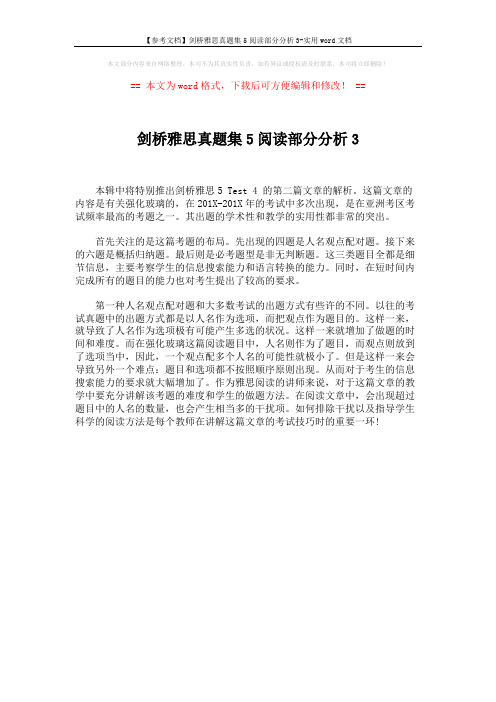
【参考文档】剑桥雅思真题集5阅读部分分析3-实用word文档本文部分内容来自网络整理,本司不为其真实性负责,如有异议或侵权请及时联系,本司将立即删除!== 本文为word格式,下载后可方便编辑和修改! ==剑桥雅思真题集5阅读部分分析3本辑中将特别推出剑桥雅思5 Test 4 的第二篇文章的解析。
这篇文章的内容是有关强化玻璃的,在201X-201X年的考试中多次出现,是在亚洲考区考试频率最高的考题之一。
其出题的学术性和教学的实用性都非常的突出。
首先关注的是这篇考题的布局。
先出现的四题是人名观点配对题。
接下来的六题是概括归纳题。
最后则是必考题型是非无判断题。
这三类题目全都是细节信息,主要考察学生的信息搜索能力和语言转换的能力。
同时,在短时间内完成所有的题目的能力也对考生提出了较高的要求。
第一种人名观点配对题和大多数考试的出题方式有些许的不同。
以往的考试真题中的出题方式都是以人名作为选项,而把观点作为题目的。
这样一来,就导致了人名作为选项极有可能产生多选的状况。
这样一来就增加了做题的时间和难度。
而在强化玻璃这篇阅读题目中,人名则作为了题目,而观点则放到了选项当中,因此,一个观点配多个人名的可能性就极小了。
但是这样一来会导致另外一个难点:题目和选项都不按照顺序原则出现。
从而对于考生的信息搜索能力的要求就大幅增加了。
作为雅思阅读的讲师来说,对于这篇文章的教学中要充分讲解该考题的难度和学生的做题方法。
在阅读文章中,会出现超过题目中的人名的数量,也会产生相当多的干扰项。
如何排除干扰以及指导学生科学的阅读方法是每个教师在讲解这篇文章的考试技巧时的重要一环!。
【资料】雅思阅读unit-5汇编

countless hopeless endless harmless
careless timeless friendless meaningless
Long sentences understanding
1. Being exceptionally strong, durable and versatile, it was used in countless products, both for building and for personal use such as clothing.
5. inhale: to breathe air, smoke, or gas into your lungs (exhale)
6. expose: uncover (exposure n.)
Word formation
-less: without, lack of (after a noun to form an adjective)
Long sentences understanding
2. Thus, workers who were employed in those industries almost certainly suffered exposure to asbestos, as did those who made the various products containing asbestos, such as pipes and roofing tiles.
Making further supplement and explanation or giving reasons.
2. The fact that it is a deadly carcinogen, or cause of cancer, was only established in the 1970s, as improvements in medical technology enabled medical researchers to establish that tiny inhaled asbestos fibres are the cause of several diseases.
雅思og test 5 阅读 解析
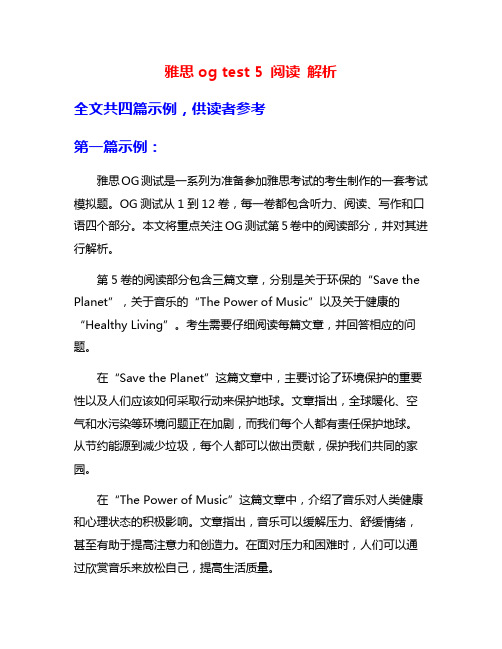
雅思og test 5 阅读解析全文共四篇示例,供读者参考第一篇示例:雅思OG测试是一系列为准备参加雅思考试的考生制作的一套考试模拟题。
OG测试从1到12卷,每一卷都包含听力、阅读、写作和口语四个部分。
本文将重点关注OG测试第5卷中的阅读部分,并对其进行解析。
第5卷的阅读部分包含三篇文章,分别是关于环保的“Save the Planet”,关于音乐的“The Power of Music”以及关于健康的“Healthy Living”。
考生需要仔细阅读每篇文章,并回答相应的问题。
在“Save the Planet”这篇文章中,主要讨论了环境保护的重要性以及人们应该如何采取行动来保护地球。
文章指出,全球暖化、空气和水污染等环境问题正在加剧,而我们每个人都有责任保护地球。
从节约能源到减少垃圾,每个人都可以做出贡献,保护我们共同的家园。
在“The Power of Music”这篇文章中,介绍了音乐对人类健康和心理状态的积极影响。
文章指出,音乐可以缓解压力、舒缓情绪,甚至有助于提高注意力和创造力。
在面对压力和困难时,人们可以通过欣赏音乐来放松自己,提高生活质量。
最后一篇文章“Healthy Living”讨论了健康生活的重要性。
文章强调了良好的饮食习惯、充足的睡眠和适量的运动对于保持健康的重要性。
只有通过均衡的生活方式,人们才能保持身体和心理的健康,享受更好的生活质量。
在阅读这三篇文章后,考生会面对一系列与文章内容相关的问题。
这些问题可能涉及文章的主旨、细节、作者意图等方面,考生需要根据文章内容正确回答问题,同时练习阅读理解能力。
通过参加雅思OG测试的阅读部分,考生可以提高自己的阅读理解能力,扩大词汇量,增强阅读速度和准确性。
这对于备考雅思考试是非常有帮助的,因为阅读部分在雅思考试中占有很大的比重,考生需要在有限的时间内快速理解文章并回答问题。
雅思OG测试第5卷的阅读部分为备考雅思考试的考生提供了宝贵的练习机会。
9分达人雅思阅读5答案
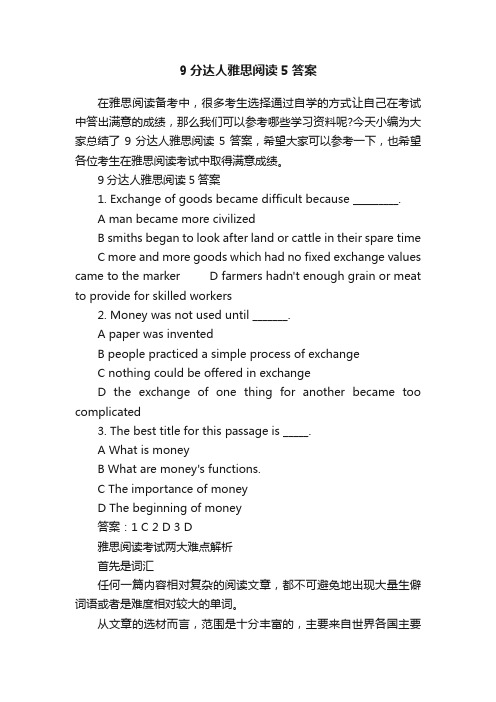
9分达人雅思阅读5答案在雅思阅读备考中,很多考生选择通过自学的方式让自己在考试中答出满意的成绩,那么我们可以参考哪些学习资料呢?今天小编为大家总结了9分达人雅思阅读5答案,希望大家可以参考一下,也希望各位考生在雅思阅读考试中取得满意成绩。
9分达人雅思阅读5答案1. Exchange of goods became difficult because _________.A man became more civilizedB smiths began to look after land or cattle in their spare timeC more and more goods which had no fixed exchange values came to the markerD farmers hadn't enough grain or meat to provide for skilled workers2. Money was not used until _______.A paper was inventedB people practiced a simple process of exchangeC nothing could be offered in exchangeD the exchange of one thing for another became too complicated3. The best title for this passage is _____.A What is moneyB What are money's functions.C The importance of moneyD The beginning of money答案:1 C 2 D 3 D雅思阅读考试两大难点解析首先是词汇任何一篇内容相对复杂的阅读文章,都不可避免地出现大量生僻词语或者是难度相对较大的单词。
雅思阅读真经5完整解析
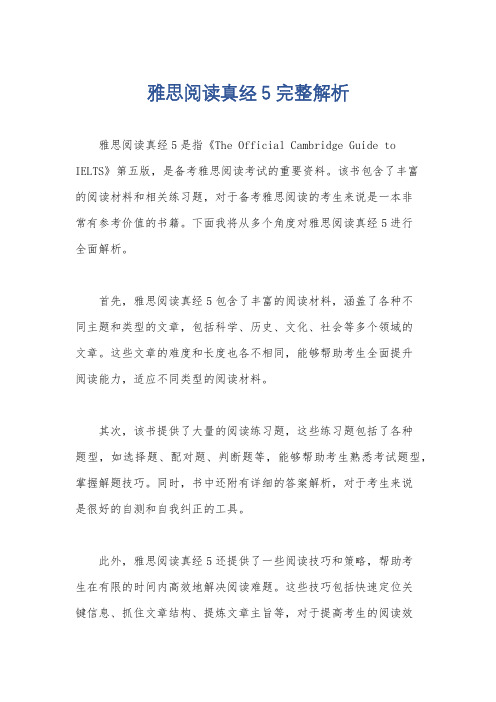
雅思阅读真经5完整解析
雅思阅读真经5是指《The Official Cambridge Guide to IELTS》第五版,是备考雅思阅读考试的重要资料。
该书包含了丰富
的阅读材料和相关练习题,对于备考雅思阅读的考生来说是一本非
常有参考价值的书籍。
下面我将从多个角度对雅思阅读真经5进行
全面解析。
首先,雅思阅读真经5包含了丰富的阅读材料,涵盖了各种不
同主题和类型的文章,包括科学、历史、文化、社会等多个领域的
文章。
这些文章的难度和长度也各不相同,能够帮助考生全面提升
阅读能力,适应不同类型的阅读材料。
其次,该书提供了大量的阅读练习题,这些练习题包括了各种
题型,如选择题、配对题、判断题等,能够帮助考生熟悉考试题型,掌握解题技巧。
同时,书中还附有详细的答案解析,对于考生来说
是很好的自测和自我纠正的工具。
此外,雅思阅读真经5还提供了一些阅读技巧和策略,帮助考
生在有限的时间内高效地解决阅读难题。
这些技巧包括快速定位关
键信息、抓住文章结构、提炼文章主旨等,对于提高考生的阅读效
率和准确性有很大帮助。
最后,雅思阅读真经5作为备考雅思阅读的资料,是由剑桥大
学出版社出版的权威教材,具有很高的权威性和可信度。
考生可以
放心地使用这本书进行备考,相信能够取得很好的效果。
总的来说,雅思阅读真经5是一本非常有参考价值的备考资料,通过系统地学习和练习,考生可以有效地提升自己的阅读能力,为
取得理想的雅思阅读成绩打下坚实的基础。
希望我的解析能够对你
有所帮助。
雅思阅读真经5答案

雅思阅读真经5答案雅思阅读真经5答案【篇一:真经5解析】lass=txt>5. safer=better,took over=alternatives,因此答案是freon。
6. 注意inventing=patentedq1: 请问第一篇冰箱的创造的第2和3空怎么定位,我在原文找不到….a: 第二第三题对应正文第四段最后一句话。
原文:and another made by physician jg, and developed vapor-compression refrigeration for the brewing and meatpacking industries.题干:and commercial refrigeration was applied to as well as industries. 对应:for=applied to; and=as well as定位词:commercial refrigerationq2: 还是冰箱那篇,为什么第5个空不能填alternatives?在原文中不是刚好接在比较级better后面吗?a: 第五题对应正文第五段第三句话。
原文:engineers worked until the 1920s to come up with better alternatives, one of which was freon.题干:the safer took over it in 1920s.对应:better=safer; come up with=took over定位词:1920s请注意,填alternative不是最优答案,最准确的是氟利昂freonreading passage 2 阿尔弗雷德诺贝尔3. 判断填形容词。
不能填explosive,因为炸药都要爆炸,因此爆炸不是炸药的风险。
可控的、安全的爆炸才是问题。
对应原文15页第5行:the safety problems。
雅思阅读真经5答案

雅思阅读真经5答案【篇一:真经5解析】lass=txt>5. safer=better,took over=alternatives,所以答案是freon。
6. 注意inventing=patentedq1: 请问第一篇冰箱的发明的第2和3空怎么定位,我在原文找不到….a: 第二第三题对应正文第四段最后一句话。
原文:and another made by physician jg, and developed vapor-compression refrigeration for the brewing and meatpacking industries.题干:and commercial refrigeration was applied to as well as industries. 对应:for=applied to; and=as well as定位词:commercial refrigerationq2: 还是冰箱那篇,为什么第5个空不能填alternatives?在原文中不是刚好接在比较级better后面吗?a: 第五题对应正文第五段第三句话。
原文:engineers worked until the 1920s to come up with better alternatives, one of which was freon.题干:the safer took over it in 1920s.对应:better=safer; come up with=took over定位词:1920s请注意,填alternative不是最优答案,最准确的是氟利昂freonreading passage 2 阿尔弗雷德诺贝尔3. 判断填形容词。
不能填explosive,因为炸药都要爆炸,所以爆炸不是炸药的风险。
可控的、安全的爆炸才是问题。
对应原文15页第5行:the safety problems。
雅思剑桥5阅读解析
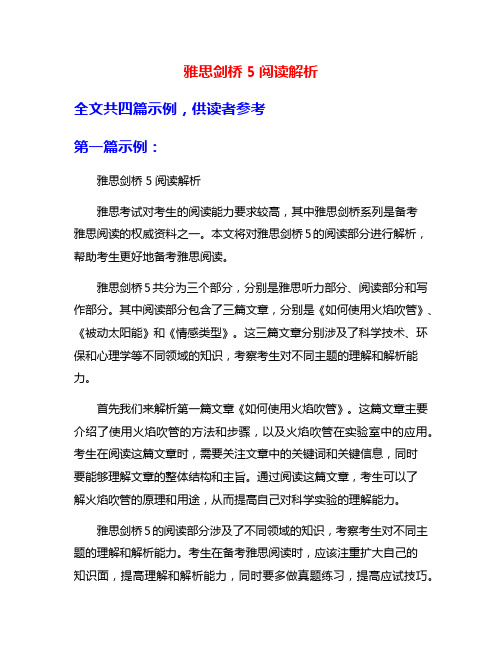
雅思剑桥5阅读解析全文共四篇示例,供读者参考第一篇示例:雅思剑桥5阅读解析雅思考试对考生的阅读能力要求较高,其中雅思剑桥系列是备考雅思阅读的权威资料之一。
本文将对雅思剑桥5的阅读部分进行解析,帮助考生更好地备考雅思阅读。
雅思剑桥5共分为三个部分,分别是雅思听力部分、阅读部分和写作部分。
其中阅读部分包含了三篇文章,分别是《如何使用火焰吹管》、《被动太阳能》和《情感类型》。
这三篇文章分别涉及了科学技术、环保和心理学等不同领域的知识,考察考生对不同主题的理解和解析能力。
首先我们来解析第一篇文章《如何使用火焰吹管》。
这篇文章主要介绍了使用火焰吹管的方法和步骤,以及火焰吹管在实验室中的应用。
考生在阅读这篇文章时,需要关注文章中的关键词和关键信息,同时要能够理解文章的整体结构和主旨。
通过阅读这篇文章,考生可以了解火焰吹管的原理和用途,从而提高自己对科学实验的理解能力。
雅思剑桥5的阅读部分涉及了不同领域的知识,考察考生对不同主题的理解和解析能力。
考生在备考雅思阅读时,应该注重扩大自己的知识面,提高理解和解析能力,同时要多做真题练习,提高应试技巧。
希望本文的解析能够帮助考生更好地备考雅思阅读,取得理想的成绩。
第二篇示例:雅思考试是全球最为知名的英语能力考试之一,而阅读部分是其中的一个重要组成部分。
剑桥雅思5是一本备考雅思阅读的经典教材,本文将对该教材进行解析,帮助考生更好地备考雅思阅读部分。
第一篇文章是关于《鸟类迁徙的进化》的,主要讲述了鸟类迁徙的特点和影响因素。
文章中提到,鸟类迁徙是鸟类适应环境变化的一种生存策略,能帮助它们避开恶劣的气候条件。
文章还讨论了鸟类迁徙的进化历程,以及不同种类鸟类迁徙的差异。
考生在阅读这篇文章时,可以先了解一下鸟类迁徙的基本概念,再仔细分析文章中提到的各种因素,理解鸟类迁徙的原因和意义。
第二篇文章是关于《短时间内消失的风景》的,主要讨论了人类活动对自然环境的影响。
文章指出,人类的过度开发和破坏导致了很多珍贵的自然景观在短时间内消失,给生态系统和生物多样性带来了巨大的影响。
雅思5.5基础课程阅读讲义-ielts-5.5-reading

雅思5.5根底阅读课程讲义UNIT 1 Education (3)UNIT 2 Food (5)UNIT 3 Health (8)UNIT 4 Media (10)Locating Information (15)UNIT 5 Practice 1 (18)UNIT 6 Advertising (20)UNIT 7 Learning to Speak (29)Summary Completion (31)UNIT 8 The Environment (31)Short Answers (34)UNIT 9 Sponsorship in Sport (34)UNIT 10 Practice 2 (39)Flowchart-Timeline Completion (41)UNIT 11 Transport (41)UNIT 12 Travel (49)UNIT 13 Technology (56)Labelling a Diagram (58)Unit14 Money (59)UNIT 15 Practice 3 (66)Multiple Choice (68)Labelling a Diagram (71)UNIT 17 Social Issues (72)IELTS Type Questions: Reading: for Details and for Main Ideas (74)Table Completion (74)UNIT 20 Practice 4 (80)Note Completion (82)UNIT 1 EducationEducation over the past 100 yearsAThe education of our young people is one of the most important aspects of any community, and ideas about what and how to teach reflect the accepted attitudes and unspoken beliefs of society. These ideas change as local customs and attitudes change, and these changes are reflected in the curriculum, teaching and assessment methods and the expectations of how both students and teachers should behave.词汇讲解:curriculum n. 教学大纲;reflect v. 反映;反射;assessment n. 评价;BTeaching in the late 1800s and early 1900s was very different from today. Rules for teachers at the time in the USA covered both the teacher's duties and their conduct out of class as well. Teachers at that time were expected to set a good example to their pupils and to behave in a very virtuous and proper manner. Women teachers should not marry, nor shou ld they ‘keep company with men.' They had to wear long dresses and no bright colours and they were not permitted to dye their hair. They were not allowed to loiter downtown in an ice cream store, and women were not allowed to go out in the evenings unless to a school function, although men were allowed one evening a week to take their girlfriends out if they went to church regularly. No teachers were allowed to drink alcohol. They were allowed to read only good books such as the Bible, and they were given a pay increase of 25c a week after five years of work for the local school.词汇讲解:manner n. 行为守那么;be expected to:被预期…表示将来时:be expected tobe predicted tobe perspective toCAs well as this long list of ‘dos' and ‘don'ts,' teachers had certain duties to perform each day. In country schools, teachers were required to keep the coal bucket full for the classroom fire, and to bring a bucket of water each day for the children to drink. They had to make the pens for their students to write with and to sweep the floor and keep the classroom tidy. However, despite this list of duties, little was stipulated about the content of the teaching, nor about assessment methods.DTeachers would have been expected to teach the three ‘r’s—reading, writing and arithmetic, and to teach the children about Christianity and read from the Bible every day. Education in those days was much simpler than it is today and covered basic literacy skills and religious education. They would almost certainly have used corporal punishment such as a stick or the strap on naughty or unruly children, and the children would have sat together in pairs in long rows in the classroom. They would have been expected to sit quietly and to do their work, copying long rows of letters or doing basic maths sums. Farming children in country areas would have had only a few years of schooling and would probably have left school at 12 or 14 years of age to join their parents in farm work.词汇讲解:arithmetic:算数;literacy:文学,阅读;religious:的;discrimination:歧视;religious discrimination:歧视。
雅思阅读5
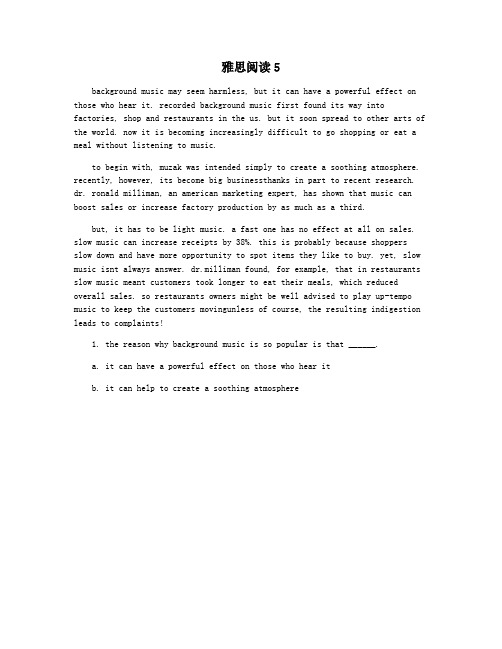
雅思阅读5background music may seem harmless, but it can have a powerful effect on those who hear it. recorded background music first found its way into factories, shop and restaurants in the us. but it soon spread to other arts of the world. now it is becoming increasingly difficult to go shopping or eat a meal without listening to music.to begin with, muzak was intended simply to create a soothing atmosphere. recently, however, its become big businessthanks in part to recent research. dr. ronald milliman, an american marketing expert, has shown that music can boost sales or increase factory production by as much as a third.but, it has to be light music. a fast one has no effect at all on sales. slow music can increase receipts by 38%. this is probably because shoppers slow down and have more opportunity to spot items they like to buy. yet, slow music isnt always answer. liman found, for example, that in restaurants slow music meant customers took longer to eat their meals, which reduced overall sales. so restaurants owners might be well advised to play up-tempo music to keep the customers movingunless of course, the resulting indigestion leads to complaints!1. the reason why background music is so popular is that ______.a. it can have a powerful effect on those who hear itb. it can help to create a soothing atmosphere。
five reviews of the wellington hotel雅思阅读
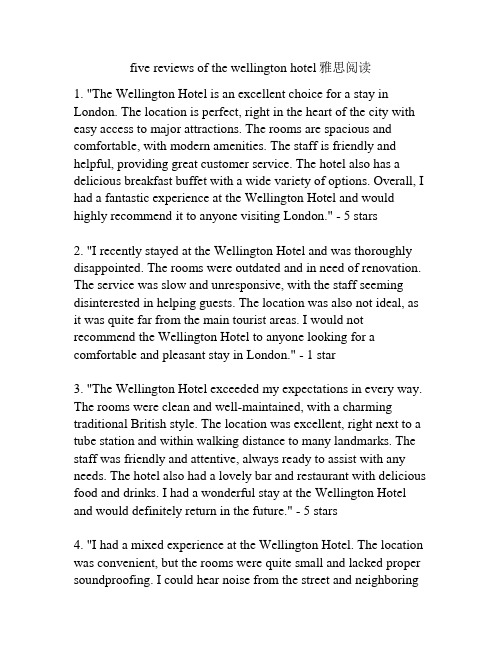
five reviews of the wellington hotel雅思阅读1. "The Wellington Hotel is an excellent choice for a stay in London. The location is perfect, right in the heart of the city with easy access to major attractions. The rooms are spacious and comfortable, with modern amenities. The staff is friendly and helpful, providing great customer service. The hotel also has a delicious breakfast buffet with a wide variety of options. Overall, I had a fantastic experience at the Wellington Hotel and would highly recommend it to anyone visiting London." - 5 stars2. "I recently stayed at the Wellington Hotel and was thoroughly disappointed. The rooms were outdated and in need of renovation. The service was slow and unresponsive, with the staff seeming disinterested in helping guests. The location was also not ideal, as it was quite far from the main tourist areas. I would not recommend the Wellington Hotel to anyone looking for a comfortable and pleasant stay in London." - 1 star3. "The Wellington Hotel exceeded my expectations in every way. The rooms were clean and well-maintained, with a charming traditional British style. The location was excellent, right next to a tube station and within walking distance to many landmarks. The staff was friendly and attentive, always ready to assist with any needs. The hotel also had a lovely bar and restaurant with delicious food and drinks. I had a wonderful stay at the Wellington Hotel and would definitely return in the future." - 5 stars4. "I had a mixed experience at the Wellington Hotel. The location was convenient, but the rooms were quite small and lacked proper soundproofing. I could hear noise from the street and neighboringrooms throughout the night, making it difficult to sleep. The staff, however, was friendly and helpful, and the breakfast was of good quality. If you are a light sleeper, I would recommend looking for alternative accommodations." - 3 stars5. "I had a terrible stay at the Wellington Hotel. The room I was given was dirty and had a strong unpleasant odor. The staff was unhelpful and unwilling to address the issues. The hotel's location was far from the city center and required a long commute to reach major attractions. Overall, I would definitely not recommend staying at the Wellington Hotel." - 1 star。
- 1、下载文档前请自行甄别文档内容的完整性,平台不提供额外的编辑、内容补充、找答案等附加服务。
- 2、"仅部分预览"的文档,不可在线预览部分如存在完整性等问题,可反馈申请退款(可完整预览的文档不适用该条件!)。
- 3、如文档侵犯您的权益,请联系客服反馈,我们会尽快为您处理(人工客服工作时间:9:00-18:30)。
roofing tiles
ceiling tiles
Word formation
resistant: resistant: adj. not harmed or affected 防/耐/抗……的 ……的
heatheat-resistant diseasedisease-resistant dustdust-resistant waterwater-resistant
Long sentences understanding
2. Thus, workers who were employed in those industries almost certainly suffered exposure to asbestos, as did those who made the various products containing asbestos, such as pipes and roofing tiles.
1. prior to: before 2. be keen to do sth.=be interested in doing sth. 3. vital: important, critical 4. it is likely to do sth. =it is possible to do sth. 5. inspect: v. check (inspection n.) 6. misery: n. disaster 7. linger: v. take a long time to leave or disappear
Long sentences understanding
1. Being exceptionally strong, durable and versatile, it was versatile, used in countless products, both for building and for personal use such as clothing.
Vocabulary
1. quality: characteristic, feature 2. insulate (insulation n.): separate, divide 3. cladding n. 镀层 4. wrap: to cover sth. with materials in order to protect them 5.motor: 5.motor: car
Word formation
-less: without, lack of (after a less: noun to form an adjective) countless hopeless endless harmless careless timeless friendless meaningless
Long sentences understanding
1. Because they are fibrous, they can continue to break up into smaller and smaller particles which are easily inhaled, after which they accumulate in the respiratory and digestive systems, as well as getting into the bloodstorm and spreading throughout the body.
boiler
Vocabulary
6. currently adv. now, at present 7. demolition: n. damage 8. maintenance: n. repairing 9. take precautions: prevent 10. occupational: relating to jobs
Long sentences understanding
For those who fear they have recently handled asbestos, exposure to the tiny fibres cannot yet be detected by medical x-rays or xsymptoms such as headaches, fever or aching muscles.
Vocabulary
Reading Passage 2
Dangers of AsbestosasbLeabharlann stosVocabulary
1. contaminate: pollute 2. exceptionally: extremely, specially 3. durable: able to last a long time without becoming damaged 4. versatile: able to be used for many different purposes 5. inhale: to breathe air, smoke, or gas (exhale exhale) into your lungs (exhale) 6. expose: uncover (exposure n.)
Long sentences understanding
1. Asbestos fibres are extremely strong which, combined with their heatheat-resistant qualities, make the product very useful as insulation in the construction industry.
Sth. is not the only option to do sth.
Raising the price of fuel is not the only option to reduce pollution.
Vocabulary
1. intact: adj. complete and not damaged 2. presence: n. existence 3. regulation: n. law or rule 4. monitor: v. watch and check 5. appropriate: adj. suitable 6. enforce: v. carry out (enforcement n.) enforce a law/a rule/ a regulation
Long sentences understanding
Employers are required to limit employee exposure to asbestos, conduct regular exposure monitoring and provide protective clothing such as coveralls, coverings for head and feet, gloves, face shields, vented goggles and other appropriate equipment.
Vocabulary
1. the naked eye: If something can be seen with the naked eye, it is visible without the help of an instrument. 2. release: make sth. free 3. accumulate: gather 4. respiratory (respirate v.): breathing 5. digest-digestive-digestion digest-digestive-
Word formation
-related
asbestosasbestos-related foodfood-related sportssports-related environmentenvironment-related
Vocabulary
1. detect: v. discover by using special equipment 2. uncertainty: n. unsureness
Making further supplement and explanation or giving reasons.
2. The fact that it is a deadly carcinogen, or cause of cancer, was only established in the 1970s, as improvements in medical technology enabled medical researchers to establish that tiny inhaled asbestos fibres are the cause of several diseases.
Recite this sentence for writing
The only option is to do sth.
The only option is to live with your parents. The only option is to keep silent. The only option is to stop to rest.
